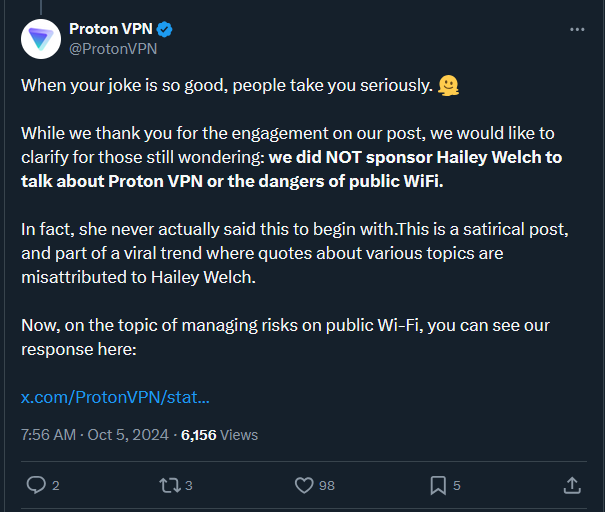I don’t know how effective VPNs are over a public WiFi network, but I do know it stopped Spectrum from sending me “you are downloading copyrighted material, stop it” emails once I started using one. Fuck Spectrum, I don’t have them anymore, but that seems like a good enough reason to keep using one in certain circumstances.
They need to advertise a legitimate use for their service.
If they don’t have a threat from public wifi or other security concerns to remedy, then the only purpose for their service is to bypass region limits and block infringement notices. They would be considered complicit in such infringement.
That their service also hinders efforts to stop pirates needs to be an “unintended” and “unavoidable” side effect.
On public WiFi I just vpn into my home network. The issue with public WiFi is that it can be sniffed by anyone in range since there is generally no encryption.
Although pretty much everything we do is over tls these days, and DoH helps protect against even dns sniffing. There’s still at least some risk to working in the clear over a public WiFi network. At least in information gathering, what bank you use, etc.
But, there’s no real benefit in using a paid vpn over one you own unless you’re downloading illegal content, want to watch another Netflix region, or are in a country with heavy Internet monitoring/filtering.
With TLS and DoH, how is your bank and other information leaked?
He said “which bank”, which could be determined by the sniffing DNS requests, or seeing which IPs his computer is connecting to.
Not a breach of his personal information (assuming the bank that he’s using and the client he’s using after putting everything in TLS properly).
Possibly the domain is visible with a traffic monitoring tool. Everything else is between you and the bank via HTTPS. Having said that, whatever is not over https is visible to whoever sits on the same network as yourself.
Can someone share proton’s response? I don’t have a xitter account
https://xcancel.com/ProtonVPN you can find it here
Appreciate the alternative!
Grabbed this screenshot because I don’t trust anything on Twitter to stay visible (or the platform to even be stable)
https://protonvpn.com/blog/public-wifi-safety/#:~:text=5 ways to stay safe on public WiFi

Thank goodness someone explained that to me. I was startong to wonder if she was some sort of technology expert, or something.
When I first saw this I thought it was funny. The fact that so many people are falling for it has only made it even funnier.
FWIW, Haley Welch might seem dumb as bricks, but she also seems quite sweet - doing charity stuff, keeping her other friend from “that” vid for the ride, etc. As far as people becoming famous for bullshit reasons goes, she seems to be handling it well.
I feel bad for her, honestly. She was open about her sexuality and she’s conventionally attractive, so now she has all these leering old men on TV slobbering all over her.
Bill Maher practically tried to talk her into bed on his show with his creepy shit about mentoring her.
Oof. What is up with these creepy, sweaty dudes on talkshows? I know they somewhat reflect the general populace, but to pull shit like this on air is just boggling.
She’s handling fame better than Chappel Roan.
You think she’s not handling fame well because she’s setting clear boundaries, and reminding fans that she’s not their friend just because she’s famous?
I don’t understand why everyone assumes using a VPN means paying for a third party. I have Wireguard deployed in my NAS and I always have that VPN connection active on my phone to be able to access my LAN deployed services remotely, Jellyfin for example.
Most VPNs sell themselves on encrypting your traffic to an endpoint that either is in a different locale to get around region locks or to put it out of the grasp of the RIAA so they can’t send your ISP copyright notices.
While remote access to a local network is a good use case for a self-hosted VPN it’s totally unrelated to the use case for commercial VPNs
For the use case of encrypting your traffic while using a public WiFi, both commercial VPNs and self-hosted ones provide the same functionality.
I think the point they’re getting at Is that you can’t use a self-hosted vpn to hide your piracy activity because the link is registered to yourself.
Yes that’s true. But also that’s the wink and nudge marketing claim that VPN marketers make while everyone knows the real reason you are using a VPN.
With HTTPS, DNS-over-HTTPS, and most endpoint firewalls dropping non-gateway traffic, the risk is a lot less than the VPN ad reads want you to believe
I do the same, but it’s very clear that when people talk about “a VPN” they’re referring to a commercial cloud hosted product.
It’s also worth mentioning that the VPN in question, Proton, offers one of the best free tiers of any VPN company.
I tried setting this up, and I can connect to my honeserver, but I’ve no idea how to access its LAN services. How does it work?
Do you have internal DNS set up? I have my wire guard deployed on both of my pihole servers, which have local DNS entries for my internal services, which point back to my internal Traefik container for NAT translations. I know that sounds a bit complicated, but that’s how it works for my environment.
For less technical people or just don’t want to deal with public-facing open port: Tailscale or Zerotier are both great option (use Tailscale if former)!
I use tailscale for hosting gameservers for friends and the occasional watch together on jellyfin. Kinda scuffed setup with one burner github account for login. And ~10 devices connected to that network. So I need to authenticate every device myself (at the beginning and sporadically) but I don’t need to pay Tailscale for adding multiple accounts to the network.
At the beginning I tried to do set up everything with my own wireguard server. I only have a public v6 IP, so some of my friends connected without problems and for some it would not work. After I think 3h helping them in their router settings I just gave up. I looked up if I could rent a service somewhere that gives me a public Ipv4 relay, found Tailscale instead and stopped looking for something else haha. Sometimes it’s not worth the effort.
I am technical, I decided to just not open up any port that’s not needed for Plex and Jellyfin, sometimes it would be nice to access radarr and sonarr remotely, but fuck I just don’t want to deal with the setup
Since Wireguard uses UDP and peers only reply to a received packet if it’s expected and valid, it won’t show up in port scans and barely increases your attack surface. Tailscale and Zerotier are quite nice, but personally I dislike NAT-punching protocols.
My setup as well (plus encrypted DNS for good measure)
I still have to somehow trust my ISP but I go down from having to trust my mobile ISP, my employer WiFi, random shops WiFi to just one ISP (that,fwiw, has shown to be transparent, customers friendly etc)
What is he talking about, public WiFi can easily poison and monitor your DNS requests (most people don’t know or use encrypted DNS), and there’s still tons of non-https traffic leaks all over the place that are plain text. Even if encrypted, there’s still deep packet inspection. VPNs can mitigate DPI techniques and shift the trust from an easily snoopable public WiFi to the VPN’s more trustworthy exit servers.
This guy really needs to elaborate on what he’s trying to say when the cyber security field very much disagrees with this stance. I’m not a huge fan of Proton, but they aren’t doing anything wrong here. You should use it for public Wi-Fi.
Dpi only works if they install a cert on your phone. Else they can’t crack it (in real time) or you would receive HTTPS errors
deleted by creator
Yeah, while it is true, lots of VPN companies are grifts just buying VPS’s and installing OpenVPN, this “Cyber security expert” puts far too much faith in HTTPS and probably never seen a lecture from the Black Hat conference
probably never seen a lecture from the Black Hat conference
Not defending Robert Graham because I’m also eyebrow raising his statement. And while you may be 100% correct that he never actually stayed to listen to a lecture, he absolutely spoke at a lot of them since 2000.
My bad for judging without checking 😔
Yup. You can grab any unencrypted data passed between the user’s browser and a server literally out of thin air when they’re connected to an open access point. You sit happily at the Starbucks with your laptop, sniffing them WiFi packets and grabbing things off of them.
Oh and you have no idea what the myriad of apps you’re using are connecting to and whether that endpoint is encrypted. Do not underestimate the ability of firms to produce software at the absolute lowest cost with corners and walls missing.
If I was someone who was to make money off of scamming people, one thing I’d have tried to do is to rig portable sniffers at public locations with large foot traffic and open WiFi like train stations, airports, etc. Throw em around then filter for interesting stuff. Oh here’s some personal info. Oh there’s a session token for some app. Let me see what else I can get from that app for that person.
We need a switch like Firefox has that disallows anything non-HTTPS, but from the phone level. Companies like Apple and Google could also eventually warn apps that they’re going to make it the default setting.
Just FYI https://shop.hak5.org/products/wifi-pineapple. There are ready-made devices that can do basically what you are describing!
How is DPI a problem if it’s encrypted? That would only work if the attacker had installed their CA cert on your client machine, right?
I’m doing DPI on my own network and I can still view TLS certificate fingerprints and some metadata that provides a good educated guess as to what a traffic flow contains. It certainly better that it’s encrypted, but there is a little information that leaks in metadata. I think that’s what was meant.
True, but this is generally not useful information to anyone. They can see you’re visiting bank.com, but they still can’t see your bank details.
It might be useful if they’re trying to target you for phishing, but a targeted attack is extremely unlikely.
Also, any wireless equipment from the past 15 years or so supports client isolation.
Client isolation doesn’t help. That is just the access point not routing traffic between connected devices. The problem with WiFi is it is a radio signal. Everybody in range can receive 100% of all communication on that network. Just by being in range the attacker can do passive sniffing. No wiretap needed like with cabled networks.
WiFi is encryoed if it uses a password. So any public WiFi without a password can be sniffed by literally every device in range (no need to connect to the WiFi for sniffing). On public WiFi with a password, the radio signal is encrypted but everybody knows the encryption key. So everybody connected to the WiFi can still sniff the traffic of everybody else.
That encryption is only on the WiFi level, so encrypted radio signals, not on the actually traffic level (like TLS/HTTPS etc).
I think it might be confusion between inspecting plaintext metadata like SNI vs actually inspecting encrypted contents (e.g. HTTPS content, headers, etc.).
Yeah, deep packet inspection really doesn’t work without breaking https security via man in the middling everything.
I’m not even an expert in this stuff, but with a tool I found online I demonstrated that it was easy to snoop people’s passwords on my school’s wifi networks back in the day. It took minutes.
That must’ve been quite a while ago
I mean, yes, I’m in my 40s, but it’s just as effective today.
I guarantee you it’s not.
I’m sorry, but I don’t believe it is. Nearly all traffic is TLS. When this is attacked, you’d get TLS error. Am I missing something?
There exist plenty of services on school campuses that send passwords in plaintext. There are services outside of school campuses that do, too. Hell, I’ve been able to bypass 2FA checks by just navigating around them, I don’t know what else to tell you, not everything out there uses the best security practices, so don’t assume that they do.
most people don’t know or use encrypted DNS
But a cybersecurity expert does. That’s the point. If you know those things, VPNs become obsolete, for most people. So why not teach people about it, instead of promoting VPNs?
And can you really trust an extremely profit focused company, that is built on user data, more than your local Café? If you’re in China, sure, use a VPN, they’re the lesser evil. But most spots don’t have the resources or expertise to analyze and sell or otherwise misuse your logs. VPN companies not only do, most rely on it.
If you’re a highly targeted person, it’s another story, but in that case your only hope is Tor or a new identity.
Encrypted DNS doesn’t solve everything. Handshake for TLS sessions is still in clear, you can usually see the SNI, and since we are talking about Wireless, usually this data is available to anybody who is in the vicinity, not just the network owner. This already means that you can see what sites someone is visiting, more or less. TLS 1.3 can mitigate some of this (for those who implement ESNI, but you don’t know that beforehand). Also TLS works until the user is not accepting invalid certificates prompts (HSTS doesn’t work for everything) and there are still tons of HTTP-based redirect (check mailing newsletters and see how many first send you to an HTTP site, for example) that can be used for MiTM attacks.
A VPN moves the trust to a single provider that you can choose, which is much better than trusting every single WiFi network you can attach to and the people connected to it, I would say.
Also if you pay for the VPN (I pay Proton), it’s not true that the company business is based on user data, they are based on subscriptions.
Proton is a non profit.
But Proton Bad? I don’t understand. The armchair security nerds on Lemmy want me to hate something.
So why not teach people about it, instead of promoting VPNs?
Ok then, in the meantime the rest of us will use a fucking VPN? I don’t know what “encrypted DNS” means, and I’m 99% you’re going to respond with either “whaaaaat you don’t know something that 99.999% of other people also don’t know? Clearly you are too dumb for the internet” or else “oh sure I’d be glad to explain that! It’s real simple, see when you have a Rosendin gembal, it befrazzles the gesticulators of your brangles (link to a Wikipedia article on brangles). So you just have to re-delineate the scanditrons to break the tensor lines in your scintrins! You can code a fairly simple app from scratch to do it, and there’s a FOSS program someone made to help you identify the cabangs in your computer’s lenticles: (link to a github page that is literally just a transcription of an eldritch god screaming in binary)”
VPNs are extremely user friendly and they are happy to explain in layman’s terms exactly what they do and how they work. If there’s a better way, it’s locked behind years of techie knowledge.
And most users don’t know what a VPN is. In both cases, they’re not gonna learn anything about it. Except you need to pay for a VPN, after figuring out which one is kinda trustworthy instead of snakeoil, while encrypted DNS is a simple setting on any OS. Nothing more. You don’t need whole articles to explain what your product does and why you respect privacy and blah, while not saying a single word that’s true. It’s a simple setting. VPNs are not only user friendly, they’re a full ripoff for most people and snakeoil. They don’t explain what they do in “laymans terms”, most of them just blatantly lie. Anything for the cash. If you want an explanation of encrypted DNS:
A DNS is kind of like your GPS. It translates an address into something more usable, e.g… like your GPS translates ‘123 Baker Street, Washington’ into coordinates, so you can use it on a map, for example. A DNS does the same, but for the internet: It translates “google.de” into a format that is actually readable and usable to the computer. However, to translate “google.de” you need to reach out to someone else, that knows the address. The thing is, if someone just pretends to give the right answer, but in fact gives you their own address, you may end up at the wrong website, or in the GPS example, at the wrong house. So instead of visiting your actual bank’s website, you’re going to visit someone else’s website, which looks basically the same, except once you log into your bank account the attacker can read that and steal all your money. In the GPS example, you would now be at the slaughterhouse instead of Disneyland. An encrypted DNS just means that you specify exactly whom you will trust, for example google, and that you want your communication with google to be encrypted, so no one can even read which website you want to visit.
If someone doesn’t understand this, they wouldn’t understand what a VPN is, even broken down to bare concepts. So for those people: It makes you safe just trust me just set this setting, no app, no account, no money required. Because that’s the level a typical VPN company argues on.
It seems like your whole threat model is avoiding DNS poisoning, which is fine, but I fail to see how you can compare using DoH/DoT to a VPN.
so no one can even read which website you want to visit.
Except for the DNS provider (in your example, Google, so… yikes), the operator of the network you’re on (since the destination IP can be rDNS’d or WHOIS’d, or simply grabbed from the Host header if your browser still tries HTTP first). Any traffic that is not encrypted will be snoopable. Traffic volume and connection times to each destination can be analyzed.
By contrast, a VPN will also use secure (if you trust the provider ofc) DNS servers for your requests, plus making all of the traffic completely opaque except for “going to this server”.
no app, no account, no money required
You can also make your own, free VPN service with a little technical knowledge.
Lmao, we’re not worried about the cafe. We’re worried about the man in the middle. And yeah with enough tech knowledge you can set up an encrypted tunnel home and use your normal connection from there. But most people aren’t that tech savvy
If you’re not relatively tech savy, a typical VPN IS the man in the middle. That’s the problem. A VPN, in itself, is very good. But as you said, non-tech savy users won’t be able to set up a VPN themselves, so they need to trust a company to route all their traffic, be their DNS server, not log anything, not be hacked and not give any data to current or future totalitarian governments. Not even I could recommend any VPN company that fulfills enough points there, especially the security related ones.
For the average person, data sales aren’t the worry. Heck their phone is already recording everything. The worry is straight up criminal enterprise, like keylogging bank passwords. If the VPN company is doing stuff like that then they’re going to eat a RICO charge. Most people really don’t care that their data gets sold.
And then just setting a private DNS and checking “the little lock at your address bar” fully prevents any digital sniffing of your credentials. No VPN needed.
But most spots don’t have the resources or expertise to analyze and sell or otherwise misuse your logs.
Most spots don’t have also the resources or expertise to secure their own spot. As I remember, cheap routers used in public places may contain a lot of vulnerabilities.
encrypted DNS
Will it help me if I’m using LbreTorrent do download piracy content on my phone? Or how it would help me to hide my location from mobile apps that extract location from IP?
No. That’s a whole different use case. We’re discussing what most people in a public network should do. Some people, such as whistleblowers, journalists etc. maybe should use a VPN. For you grandparents, it would be pure snake oil. And even as such an endangered person, choosing the wrong, so almost all, VPNs would be even more dangerous.
For your problems, a VPN could be useful, even though for the former I would use the usenet or soap2day-like sites, which do not have you seed that content. If you still want to share it, then use a VPN. ONLY for the torrent process, not for anything else, as that would still be bad for privacy and security, as the VPN company could, and most WILL, surveil and log you. And for the latter problem, don’t use such apps except in closed environments or without internet access.
And for the latter problem, don’t use such apps except in closed environments or without internet access.
While that is a right answer, I do not want to avoid such apps because I need them. I need my mobile bank app, I need google camera, sometimes I need Google maps, etc. For me using VPN to hide my real IP from greedy apps and to hide DNS requests from the cracked public WiFi is still a good tradeoff between security, privacy and my own user experience.
If it works for you, and you found a VPN provider you can trust, or at least have the feeling of that, great! That is one of the very rare use cases where VPNs are not only useful, but actually have a purpose.
On a broader scale, most people won’t find a trustworthy VPN, and would use it for way more than they need to, essentially giving all data to the VPN company now, instead of just to the local Café or google.
And for the bank app, there is no replacement. Google’s camera can be replaced by OpenCamera, or just disallowed to access the internet, and google maps can almost perfectly be replaced by organic maps
I have Pixel with GrapheneOS and I tried most of FOSS camera apps, but all of them are still far behind the GCam. I hope one day there will be a good replacement, but not today.
I’m using Organic / OsmAnd for most of use cases and daily navigation. But if you need to find a specific office, shop, food or ATM nearby you still need GMap from time to time…
Doesn’t Graphene not support Gapps at all?
People can’t learn not to throw trash in the street, climate change that is backed by decades of science is a problem, or hell, they can’t even learn to effectively not click on super suspicious phishing links.
How on earth are they going to learn about implementing encrypted DNS when most barely know the difference between a browser and a computer.
Then they won’t know what a VPN is either.
This was nothing more than a poorly executed joke from Proton. Some people are massively overreacting.
I’m not online enough to understand this.
Hailey “Hawk Tuah” Welch is an influencer that gained a lot of popularity from her nickname (the sound of spitting, with HEAVY implications of performing fellacio). She used her platform to voice a very reasonable and intelligent opinion, which surprised a lot of people because her nickname is essentially blowjob queen.
One of her opinions is that it’s important to spread cyber security and used her fame to try to educate the public (potentially a fake story from the image? Idk this drama). And some xit-head claiming to be a cyber security expert ate the onion and offered some shitty advice. Proton fact checked them, because there are a ton of fake news stories about her right now.
I’m pretty sure that Proton quoting her in the first place is fake. I know she’s milking her 15 minutes of fame for all she can, but this seems outside her experience.
but this seems outside her experience.
When has that ever stopped people from saying shit.
Sorry, not just implication; she was straight up talking about that.
deleted by creator
how do I reboot my computer?
Throw a brick at it.
that’s gonna brick it. it’s right there in its name.
people on the internet and their advice sometimes, ffs.
Nah, you just gotta do it correctly, yeah you might brick a few computers, TVs, cars or a couple electrical mains boxes, but once you master the technique you’ll be able to restart anything.
We call that percussive maintenance… the brick is optional.
That’s just turning it off with Style✨
Considering how most of the Internet is encrypted with TLS, if you add DNSSEC+DoH/DoT on top, trying to MITM someone on a public WiFi is way harder than it was, unless you’re a state-level adversary and you’re able to craft valid certificate for a domain you don’t control from a globally trusted (root) certificate autority (which will lose its trusted status quite fast once discovered, ex: CNNIC)
Not all applications on your computer may be encrypting their packet traffic properly, though. That goes especially for the applications that might be trying to reach out for resources on your local home network (like printers, file shares, and other home servers) as well as DNS requests which are usually still made in the open. I would not recommend eschewing an entire security layer willy-nilly like that. On public Wi-Fi, I would definitely still suggest either a VPN or using your cell phone as a tether or secure hotspot instead if possible.
Sure, but it’s also like, if you’re stepping away from your laptop for a few minutes should you lock the screen or shut it down completely.
The most secure option is to shut it down completely, but also it’s fine to just lock your screen.
If you’ve already got a VPN and it’s as easy as locking your screen to enable, go for it, use it. But if you don’t, you don’t need to go out and get one. You’ll generally be ok without one.
The most secure option is bringing the laptop with you.
I mean, technically - the most secure option is irrevocably destroying the laptop everytime you have a break.
Oh so a one time pad
Yeah, the days of your local coffee shops Wi-Fi being a problem or mostly gone. Not the VPN doesn’t have a place anymore though. If you’re trying to hide your downloading of ISOs from your ISP it’s still a perfectly reasonable method. Or temporarily relocating yourself to another country to make a purchase or watch some streaming content both perfectly reasonable.
Of course some of the streaming providers are getting wise to this.
why would I need to hide my terabytes of Linux ISO downloads?
You don’t want their admin to contact you about how you’re a n00b for not using Arch.
Bill Gates, man, Bill Gates
It’s all fun and games until a Microsoft Purity Enforcement squad is kicking in your door.
Nah, it’s all good I subscribe to Linus Torvalds protection services. When the Microsoft vans get within four blocks of my address, They’ll drop ship in dozens of fully-armed penguin paratroopers. After the incursion they even send in a penguin based cleaner team to help get rid of the remains.
Because we see which distros you’re using, and we judge you for it.
Gentoo, in 2024? Really? You should be using Arch if that’s your thing. It’s not the 90s any more.
Arch? I prefer EndeavorOS as it lets me easily install an arch distro using a nice GUi, I really don’t care about the nitty gritty of setting up my own network manually, i am like 99.9% of people in that regard
I have a VPN so I can securely access my home network when I’m away
I use a VPN for the same reason I use the Internet. Porn.
Yeah, pptp will always have a strong purpose and home. I’m more speaking to the viability of commercial anonymization VPN.
I have a feeling you are using pptp as shorthand for Point to Point disregarding protocol and already knows what I’m about to say. To anyone else reading this - PPTP is obsolete and unsafe. Use an alternative such as OpenVPN, WireGuard or SSTP.
Tailscale FTW. I honestly haven’t looked at the underlying protocols in years. Was using ubiquiti’s implementation of openVPN but it seemed to get grumpy when you connect one user multiple times.
Poking around at available products, I had settled on zero tier and tailscale, I went ahead and tried tail scalefirst because it was basically free for my house. One month in, I had a few decent detectable guys at work join me on a trial there. Full licenses for everybody at work cost less than my Cisco refresh. And makes it so that the office is no longer a critical hosting site.
Or the tld is .mobi
Interesting read, thanks!
"It’s a prank bro"😅 but seriously as an IT guy I’m tired of pushing VPNs down our (collective) throats, not saying the threat isn’t real but it’s really overblown by the ads
Just free, unregulated market shenanigans.
This was poorly executed. The National Park Service twitter account does jokes well.
Taking cybersecurity advice from someone called Hawk Tuah is modern day version of clicking banner that says find 40+ single women in your zip code
Hot MILFs wanna talk to YOU!
Dude is completely right. VPNs are good against geoblocking but thats it. All VPN providers that claim not to log stuff are lying and if there are logs it doesnt make a difference privacy wise
You know, from a business standpoint, it makes financial sense NOT to log user traffic.
Reason one: plausible deniability. You can’t give what you don’t have.
Reason two: storage. Why the fuck would you keep logs, when it costs money to?
Reason three: these boots taste fantastic! (People generally don’t enjoy licking boots).
Well with https enforced and secure dns not much to worry about.
Maybe from a security perspective but in terms of privacy, no. SNI can still be read, and just because DNS isn’t plaintext doesn’t mean it’s not possible to see which servers you’re talking to. And like others have said, there’s still a lot happening in plaintext at the OS and/or application level.
Still doesn’t make a VPN the “magic all in one solution” it claims to be. And SNI is encrypted on newer servers using encrypted client hello (ECH).
In terms of privacy, you’re switching around which entity gets to see a ton of details. Do you trust random public wifi enough, given modern security standards? Or do you trust a VPN company more, despite false advertising?
Use HTTPS and DoH (Becoming a default on some Android versions), and the average person will be just fine without a VPN.
Also - using someone who got famous by describing sucking dick seems quite weird :) Who wants technical advice from her?
What does sucking dick have to do with technical competency?
That’s the joke.






























